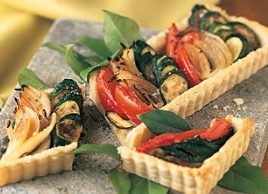Vegetable Tart Provencale
Brimming with the sunny flavours typical of southern France, this delectable vegetable tart provencale is perfect for a lunch or light dinner. An easy-to-assemble, herb-scented crust is the perfect partner for heart-healthy fresh vegetables.
Source: Cook Smart for a Healthy Heart, Reader’s Digest Canada

| Servings | Prep Time | Cook Time |
| 4servings | 10minutes | 45minutes |
| Servings | Prep Time |
| 4servings | 10minutes |
| Cook Time |
| 45minutes |
- 2 large onions sliced
- all-purpose flour for dusting
- 1/2 puff pastry package
- 2 zucchinis
- 4 tomatoes cut into 5 mm slices
- 2 tbsp Parmesan cheese freshly grated
|
Ingredients
Servings: servings
Units:
|
- Coat a large nonstick frying pan with nonstick cooking spray and set over medium-high heat until hot. Reduce the heat to medium-low and sauté the onions until very soft and golden, 20 minutes. Transfer to a plate.
- Preheat the oven to 400°F (200°C). Lightly sprinkle a work surface with flour and form the pastry into a 32 x 22 cm (12 x 8 in.) rectangle or 27 cm (10 in.) round. Fold in half and transfer to a 28 x 18 cm (11 x 7 in.) tart pan or a 23 cm (9 in.) round tart pan with a removable bottom. Trim pastry edges.
- Cut the zucchini on the diagonal into long slices 5 mm thick. Lightly coat the frying pan again with cooking spray and set over medium heat. Sauté the zucchini until golden, about 5–7 minutes.
- Arrange the zucchini, tomatoes and onions in rows on the pastry, standing them up and overlapping them slightly. Sprinkle with Parmesan cheese. Bake vegetable tart provencale until the crust is golden, about 20 minutes. Serve hot, warm or at room temperature.
Per serving: 393 calories, 9 g protein, 23 g total fat, 3 g saturated fat, 26 mg cholesterol, 38 g total carbohydrate, 8 g sugars, 5 g fibre, 80 mg sodium
Centuries ago, folk healers recommended onions as a heart tonic. Modern science supports this ancient practice. Studies indicate that flavonoids, compounds present in onions, may raise the levels of HDL (“good”) cholesterol, thus protecting against the artery-clogging damage of LDL (“bad”) cholesterol. These and onion’s sulphur compounds can hinder the formation of blood clots, which may further help protect against heart attacks.




